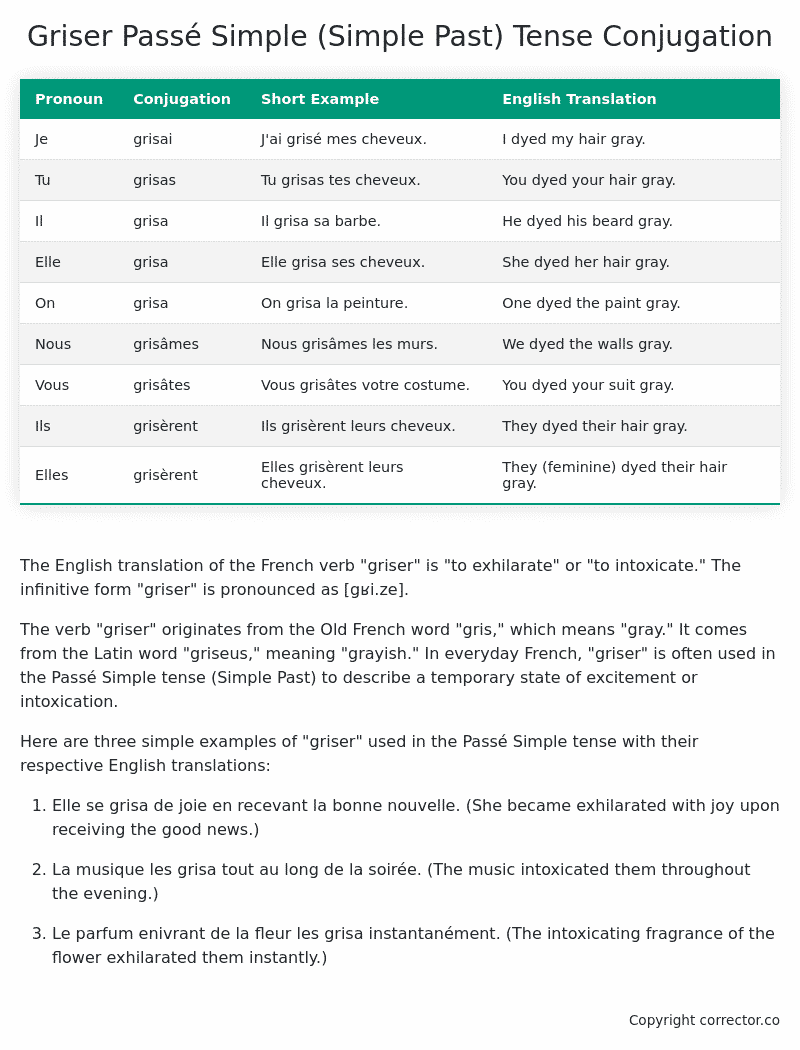Passé Simple (Simple Past) Tense Conjugation of the French Verb griser
Introduction to the verb griser
The English translation of the French verb “griser” is “to exhilarate” or “to intoxicate.” The infinitive form “griser” is pronounced as [gʁi.ze].
The verb “griser” originates from the Old French word “gris,” which means “gray.” It comes from the Latin word “griseus,” meaning “grayish.” In everyday French, “griser” is often used in the Passé Simple tense (Simple Past) to describe a temporary state of excitement or intoxication.
Here are three simple examples of “griser” used in the Passé Simple tense with their respective English translations:
-
Elle se grisa de joie en recevant la bonne nouvelle.
(She became exhilarated with joy upon receiving the good news.) -
La musique les grisa tout au long de la soirée.
(The music intoxicated them throughout the evening.) -
Le parfum enivrant de la fleur les grisa instantanément.
(The intoxicating fragrance of the flower exhilarated them instantly.)
Table of the Passé Simple (Simple Past) Tense Conjugation of griser
| Pronoun | Conjugation | Short Example | English Translation |
|---|---|---|---|
| Je | grisai | J’ai grisé mes cheveux. | I dyed my hair gray. |
| Tu | grisas | Tu grisas tes cheveux. | You dyed your hair gray. |
| Il | grisa | Il grisa sa barbe. | He dyed his beard gray. |
| Elle | grisa | Elle grisa ses cheveux. | She dyed her hair gray. |
| On | grisa | On grisa la peinture. | One dyed the paint gray. |
| Nous | grisâmes | Nous grisâmes les murs. | We dyed the walls gray. |
| Vous | grisâtes | Vous grisâtes votre costume. | You dyed your suit gray. |
| Ils | grisèrent | Ils grisèrent leurs cheveux. | They dyed their hair gray. |
| Elles | grisèrent | Elles grisèrent leurs cheveux. | They (feminine) dyed their hair gray. |
Other Conjugations for Griser.
Le Present (Present Tense) Conjugation of the French Verb griser
Imparfait (Imperfect) Tense Conjugation of the French Verb griser
Passé Simple (Simple Past) Tense Conjugation of the French Verb griser (You’re reading it right now!)
Passé Composé (Present Perfect) Tense Conjugation of the French Verb griser
Futur Simple (Simple Future) Tense Conjugation of the French Verb griser
Futur Proche (Near Future) Tense Conjugation of the French Verb griser
Plus-que-parfait (Pluperfect) Tense Conjugation of the French Verb griser
Passé Antérieur (Past Anterior) Tense Conjugation of the French Verb griser
Futur Antérieur (Future Anterior) Tense Conjugation of the French Verb griser
Subjonctif Présent (Subjunctive Present) Tense Conjugation of the French Verb griser
Subjonctif Passé (Subjunctive Past) Tense Conjugation of the French Verb griser
Subjonctif Imparfait (Subjunctive Imperfect) Tense Conjugation of the French Verb griser
Subjonctif Plus-que-parfait (Subjunctive Pluperfect) Tense Conjugation of the French Verb griser
Conditionnel Présent (Conditional Present) Tense Conjugation of the French Verb griser
Conditionnel Passé (Conditional Past) Tense Conjugation of the French Verb griser
Conditionnel Passé II (Conditional Past II) Tense Conjugation of the French Verb griser
L’impératif Présent (Imperative Present) Tense Conjugation of the French Verb griser
L’impératif Passé (Imperative Past) Tense Conjugation of the French Verb griser
L’infinitif Présent (Infinitive Present) Tense Conjugation of the French Verb griser
L’infinitif Passé (Infinitive Past) Tense Conjugation of the French Verb griser
Le Participe Présent (Present Participle) Tense Conjugation of the French Verb griser
Le Participe Passé (Past Participle) Tense Conjugation of the French Verb griser
Struggling with French verbs or the language in general? Why not use our free French Grammar Checker – no registration required!
Get a FREE Download Study Sheet of this Conjugation 🔥
Simply right click the image below, click “save image” and get your free reference for the griser Passé Simple tense conjugation!

Griser – About the French Passé Simple (Simple Past) Tense
Formation
Usage
Narration
Historical Context
Interactions with other tenses
Passé Composé
Imparfait
Conditional and Subjunctive
Summary
I hope you enjoyed this article on the verb griser. Still in a learning mood? Check out another TOTALLY random French verb conjugation!


